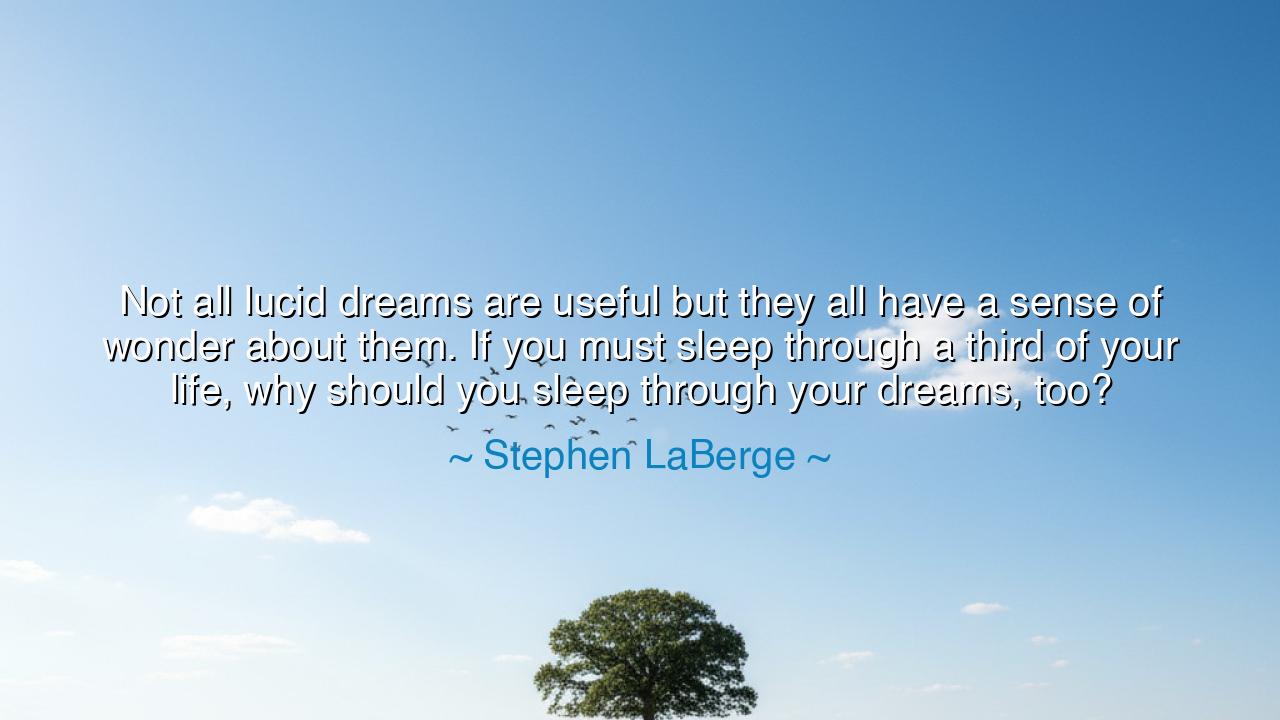
Not all lucid dreams are useful but they all have a sense of
Not all lucid dreams are useful but they all have a sense of wonder about them. If you must sleep through a third of your life, why should you sleep through your dreams, too?






The words of Stephen LaBerge, “Not all lucid dreams are useful but they all have a sense of wonder about them. If you must sleep through a third of your life, why should you sleep through your dreams, too?” carry the voice of a sage who has glimpsed the secret frontiers of the human mind. They are not merely about lucid dreaming, but about awareness, consciousness, and the art of living fully, even in the hours when the world believes us at rest. LaBerge, a pioneer in the scientific study of lucid dreams, invites us to awaken not just from sleep, but from the deeper slumber of unawareness that veils our waking and dreaming lives alike. Beneath his words lies a timeless challenge: Do not waste your hours in forgetfulness—whether awake or asleep—when every moment holds the potential for wonder.
To understand LaBerge’s teaching, we must first know his path. In the latter half of the twentieth century, when dreams were thought to be untouchable shadows of the mind, LaBerge proved that humans could awaken within them—that one could dream and yet know they were dreaming. Through rigorous study and bold experimentation, he showed that the dreamer could move, speak, and choose within the dream world, as though standing at the border between the visible and the invisible. His discovery was not only scientific but spiritual—a revelation that the mind’s awareness need not be bound by the body’s waking state. Thus, he opened a doorway to the inner cosmos, where imagination and consciousness meet.
Yet, when LaBerge says, “Not all lucid dreams are useful,” he reminds us that even in this realm of mastery, not every vision serves a purpose. Some dreams may drift like clouds of wonder—beautiful, fleeting, unmeasured. But usefulness is not the only measure of worth. For even in the seemingly idle dance of the dream, there lies mystery, awe, and the soul’s communion with the infinite. To experience such wonder, to know oneself as both the dreamer and the dreamed, is to taste the essence of consciousness itself. What greater gift can a human possess than to be awake within their own imagination?
In these words also lies a metaphor for all of life. We spend, as LaBerge notes, a third of our existence in sleep, but how many of us truly awaken even in the daylight hours? How many move through life half-conscious, guided by habit rather than intention? LaBerge’s question—“Why should you sleep through your dreams?”—becomes a challenge to all who drift through their days without awareness. If in sleep we can train ourselves to awaken, how much more should we strive to awaken in life—to see the beauty we ignore, the possibilities we overlook, the power of our own minds to shape reality? The lucid dream, then, becomes a symbol of lucid living.
The ancients, too, understood the dream as sacred ground. In Egypt, dreams were seen as messages from the gods, and temples were built where seekers might sleep and receive divine vision. The philosopher Aristotle, though a man of reason, admitted that in dreams there was knowledge beyond logic’s reach. And the prophet Joseph, whose dreams once guided kings, knew that the symbols of sleep carried truths deeper than any waking voice could tell. To them, as to LaBerge, dreams were not mere illusions—they were doors to the unseen self, mirrors of the soul’s infinite landscape.
There is a story from the East, of Chuang Tzu, the Chinese sage, who once dreamt he was a butterfly. Upon waking, he could not tell whether he was Chuang Tzu who had dreamed he was a butterfly, or a butterfly now dreaming it was Chuang Tzu. In his paradox lies the same wonder LaBerge celebrates—the mystery of awareness, the play of consciousness that defies all boundaries. For whether in dream or in waking, the essence of existence is awareness itself, and to lose it is to sleep through the miracle of being alive.
And so, LaBerge’s words become more than an invitation to explore the science of dreaming—they become a call to awaken the soul. To live fully is to be awake in every realm: in action and reflection, in waking and sleeping, in the outer world and the inner. The lucid dreamer learns to gaze into the fabric of illusion and find truth; the lucid soul learns to walk through life’s shadows with eyes open, seeing wonder even in sorrow, purpose even in stillness.
Let this be the lesson, then, for those who seek to live deeply: do not sleep through your life. Do not let your days pass in numbness or your nights in oblivion. Whether you dream with open eyes or closed, be present in the mystery. Cultivate awareness—through meditation, through reflection, through the art of attention. If a third of life must be given to sleep, let that sleep too become sacred. Let your dreams be not escapes, but journeys. And when you awaken, carry the light of those dreams into the day, until all your living becomes a single, unbroken act of wonder.
For as LaBerge reminds us, the world of dream and waking are not two—they are one vast continuum of consciousness, and the true purpose of both is not rest, but revelation. So awaken, traveler of both realms—awake to your dreams, and awaken within them, for in doing so, you awaken to the fullness of your own being.






AAdministratorAdministrator
Welcome, honored guests. Please leave a comment, we will respond soon